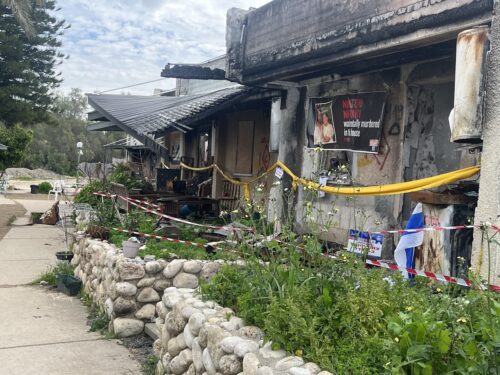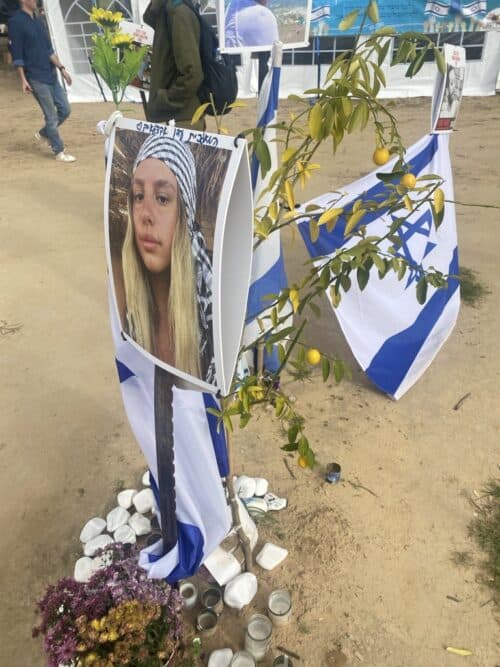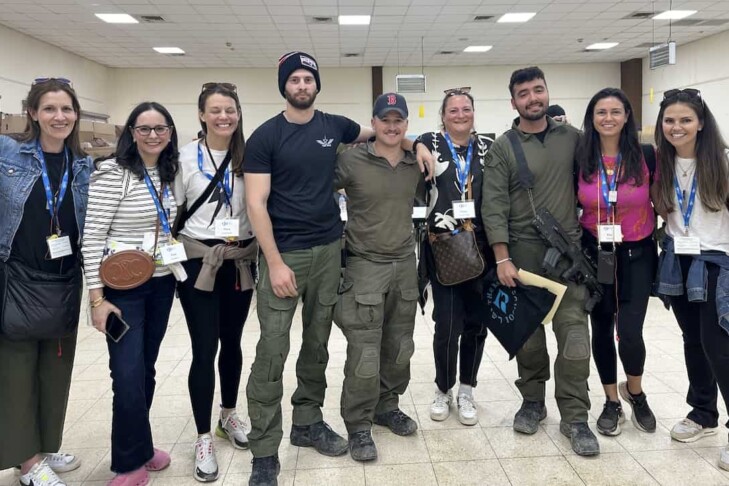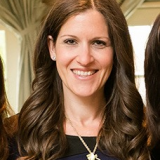The Jewish people recently celebrated Tu BiShvat, the new year for the trees. It is the time when the trees begin to wake up after their winter rest and the fruit-bearing cycle begins. Having had the great honor of joining a group of 30 Boston-area participants on a recent solidarity mission to Israel, I noticed the blooming trees all around Israel. It’s citrus season—I was immediately struck by the stark contrast of vibrant colors and sweet, ripe fruit against a backdrop of horrors and sadness throughout our two-and-a-half-day trip.

We began one morning at K’far Aza, a kibbutz on the Gaza border ravaged by Hamas terrorists on Oct. 7. Words and pictures cannot begin to describe the horrific scenes from the kibbutz. Entire rows of homes were destroyed with explosive devices and fires. The names and faces of those murdered or kidnapped remain plastered on each home, and the destruction is so severe, it almost looks unreal. In what was once a picturesque utopian village, no signs of human life remain as the survivors have been evacuated. But in between rows of horror and death are orange trees, filled with beautiful, ripe fruit, bringing color and life to the destroyed and vacated community.
And then we visited an Israel Defense Forces (IDF) base situated on the northern border between Gaza and Israel. This was the location where thousands of Gazans previously entered Israel daily to work or to access health care, but on Oct. 7 became an entry point for hundreds of murderers who destroyed infrastructure, killed IDF soldiers, and ransacked peaceful communities and killed innocent people. Again, the horrors are bone-chilling and indescribable. Nobody from the base survived that day. But the fruit trees, thriving and producing, remain.

On to the site of the Nova music festival, we were greeted by 364 posters of smiling young adults who were killed, and 40 gleaming photos of those taken hostage—the pain and sadness was inconceivable. My heart hurt. Walking through the memorial, reading names and staring into the eyes of the innocent victims, I stumbled upon the picture of a beautiful young lady, surrounded by memorial candles, and the fresh, citrusy scent from a newly planted lemon tree. The young woman’s body is gone, but like the lemon tree, her spirit and aura are incredibly bright.
And at Ofakim, a small city accidentally stumbled upon by terrorists who took a wrong turn, I saw orange, tangerine, kumquat, lemon and lime trees in front yards and backyards of homes covered in bullet holes and broken glass. This residential neighborhood, one of the poorest communities in Israel, is where Rachel, the infamous “cookie lady,” baked fresh sweets for terrorists who infiltrated her home as a tactic to fill time and fill their stomachs to prevent further death and destruction. In her honor, the JDC opened a community kitchen, and our group brought supplies and utensils to enable the residents to join together for nourishment, sustenance and community.
In that communal kitchen, I saw the smiles of young children baking cupcakes and heard messages of gratitude from the residents. These same messages were echoed by wounded soldiers at Sheba Hospital, residents of the now-relocated Kibbutz Re’im, recipients of mental health care services after returning from the front lines in Gaza and countless other beneficiaries of CJP’s Israel Emergency Fund. And when I saw the hope-filled eyes of 18-year-olds being sworn in as paratroopers and sang “Hatikva” (“The Hope”) at the Kotel (Western Wall), I emotionally reflected on our profound history of triumph and survival. Am Yisrael Chai. The Jewish people have lived. Am Yisrael Chai. The Jewish people will continue to live.
We were in Israel to show support, to pay our respects and to stand side-by-side with our brothers and sisters. Like the fruit trees, the Israeli people are resilient. Our roots date back thousands of years in the Land of Israel, and our commitment to the land and to one another is stronger than ever. I left the trip with many open questions and concerns, but confident that the global Jewish community will continue to produce assistance and support for Israel, and that our people’s strength and fortitude will ensure not only our survival, but, against all odds, our sustained blossoming and our perpetual bounty.
For more information on upcoming solidarity missions to Israel, please email juliesueg@cjp.org.



